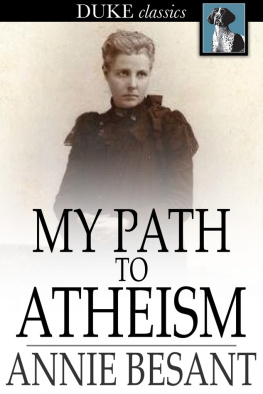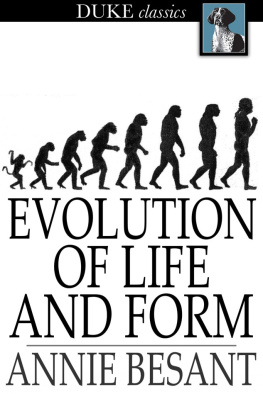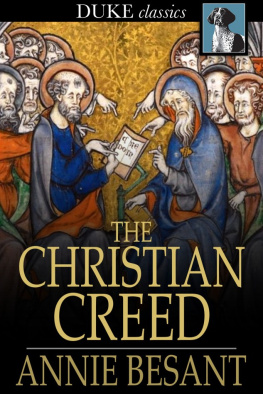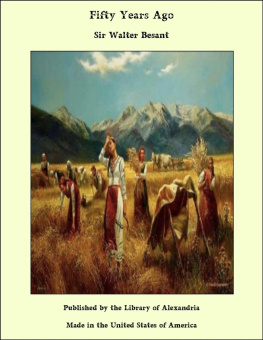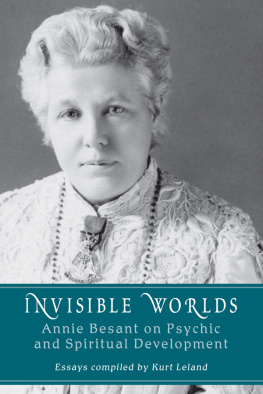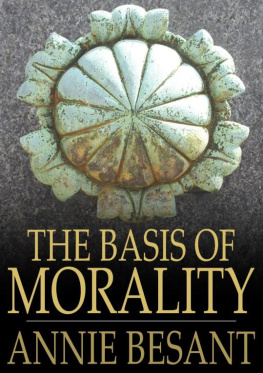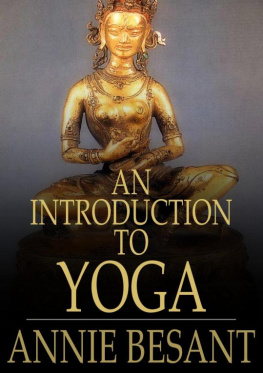I. MARRIAGE
T he recognition of human rights may be said to be of modern growth, and even yet they are but very imperfectly understood. Liberty used to be regarded as a privilege bestowed, instead of as an inherent right; rights of classes have often been claimed: right to rule, right to tax, right to punish, all these have been argued for and maintained by force; but these are not rights, they are only wrongs veiled as legal rights. Jean Jacques Rousseau struck a new note when he cried: "Men are born free;" free by birthright was a new thought, when declared as a universal inheritance, and this "gospel of Jean Jacques Rousseau" dawned on the world as the sun-rising of a glorious daya day of human liberty, unrestrained by class. In 1789 the doctrine of the "Rights of Man" received its first European sanction by law; in the August of that year the National Assembly of France proclaimed: "Men are born, and remain, free and equal in rights.... The aim of political association is the conservation of the natural and imprescriptible rights of man; these rights areliberty, property, safety, and resistance of tyranny." During savage and semi-civilised ages these "imprescriptible rights" are never dreamed of as existing; brute force is king; might is the only right, and the strong arm is the only argument whose logic meets with general recognition. In warlike tribes fair equality is found, and the chief is only primus inter pares; but when the nomadic tribe settles down into an agricultural community, when the habit of bearing arms ceases to be universal, when wealth begins to accumulate, and the village or town offers attractions for pillage, then strength becomes at once a terror and a possible defence. The weak obey some powerful neighbour partly because they cannot resist, and partly because they desire, by their submission, to gain a strong protection against their enemies. They submit to the exactions of one that they may be shielded from the tyranny of many, and yield up their natural liberty to some extent to preserve themselves from being entirely enslaved. Very slowly do they learn that the union of many individually feeble is stronger than a few powerful, isolated tyrants, and gradually law takes the place of despotic will; gradually the feeling of self-respect, of independence, of love of liberty, grows, until at last man claims freedom as of right, and denies the authority of any to rule him without his own consent.
Thus the Rights of Man have become an accepted doctrine, but, unfortunately, they are only rights of man, in the exclusive sense of the word. They are sexual, and not human rights, and until they become human rights, society will never rest on a sure, because just, foundation. Women, as well as men, "are born and remain free and equal in rights;" women, as well as men, have "natural and imprescriptible rights;" for women, as well as for men, "these rights areliberty, property, safety, and resistance of tyranny." Of these rights only crime should deprive them, just as by crime men also are deprived of them; to deny these rights to women, is either to deny them to humanity qua humanity, or to deny that women form a part of humanity; if women's rights are denied, men's rights have no logical basis, no claim to respect; then tyranny ceases to be a crime, slavery is no longer a scandal; "either all human beings have equal rights, or none have any."
Naturally, in the savage state, women shared the fate of the physically weak, not only because, as a rule, they are smaller-framed and less muscular than their male comrades, but also because the bearing and suckling of children is a drain on their physical resources from which men are exempt. Hence she has suffered from "the right of the strongest," even more than has man, and her exclusion from all political life has prevented the redressal which man has wrought out for himself; while claiming freedom for himself he has not loosened her chains, and while striking down his own tyrants, he has maintained his personal tyranny in the home. Nor has this generally been done by deliberate intention: it is rather the survival of the old system, which has only been abolished so slowly as regards men. Mrs. Mill writes: "That those who were physically weaker should have been made legally inferior, is quite conformable to the mode in which the world has been governed. Until very lately, the rule of physical strength was the general law of human affairs. Throughout history, the nations, races, classes, which found themselves strongest, either in muscles, in riches, or in military discipline, have conquered and held in subjection the rest. If, even in the most improved nations, the law of the sword is at last discountenanced as unworthy, it is only since the calumniated eighteenth century. Wars of conquest have only ceased since democratic revolutions began. The world is very young, and has only just begun to cast off injustice. It is only now getting rid of negro slavery. It is only now getting rid of monarchical despotism. It is only now getting rid of hereditary feudal nobility. It is only now getting rid of disabilities on the ground of religion. It is only beginning to treat any men as citizens, except the rich and a favoured portion of the middle class. Can we wonder that it has not yet done as much for women?" ("Enfranchisement of Women," Mrs. Mill. In J. S. Mill's "Discussions and Dissertations," Vol. II., page 421.) The difference between men and women in all civil rights is, however, with few, although important, exceptions, confined to married women; i.e., women in relation with men. Unmarried women of all ages suffer under comparatively few disabilities; it is marriage which brings with it the weight of injustice and of legal degradation.
In savage times marriage was a matter either of force, fraud, or purchase. Women were merchandise, by the sale of whom their male relatives profited, or they were captives in war, the spoil of the conqueror, or they were stolen away from the paternal home. In all cases, however, the possession once obtained, they became the property of the men who married them, and the husband was their "lord," their "master." In the old Hebrew booksstill accounted sacred by Jews and Christiansthe wife is regarded as the property of her husband. A man may "sell his daughter to be a maidservant" i.e., a concubine, as is shown by the following verse (Ex. xxi. 7), and Jacob served seven years for each of his wives, Leah and Rachel; his other two wives were his by gift, and were rather concubines than recognised wives, their children counting to their mistresses. If a Hebrew conquered his enemies, and saw "among the captives a beautiful woman, and hast a desire unto her, that thou wouldst have her to thy wife," he might take her home, and become her husband, "and she shall be thy wife" (Deut. xxi 10-14). After the destruction of Benjamin, as related in Judges xx., it was arranged that the survivors should possess themselves of women as wives by force and fraud: "Life in wait in the vineyards, and see and behold if the daughters of Shiloh come out to dance in dances, then come ye out of the vineyards, and catch you every man his wife.... And the children of Benjamin did so, and took their wives according to their number, of them that danced, whom they caught" (Judges xxi. 20, 21, 23). The same plan was adopted by the Romans in their earliest days, when they needed wives. Romulus invited the people of the Sabines and the neighbouring towns to see some public games, and in the midst of the show the Romans rushed in and carried off all the marriageable maidens they could lay hands on (Liddell's "History of Rome," p. 20). These instances may be objected to as legendary, but they are faithful pictures of the rough wooing of early times. Among some barbarous nations the winning of a bride is still harsher: the bridegroom rushes into the father's house knocks the maiden down, picks up her senseless body, flings it over his shoulder, and runs for his life; he is pursued by the youth of the village, pelted with stones, sticks, &c., and has to win his wife by sheer strength and swiftness. In some tribes this is a mere marriage ceremony, a survival from the time when the fight was a real one, and amongst ourselves the slipper thrown after the departing bridegroom and bride is a direct descendant of the heavier missiles thrown with deadly intent thousands of years ago by our remote ancestors. Amongst many semi-barbarous nations the wives are still bought; in some parts of Africa the wooer pays a certain number of cows for his bride; in other places, money or goods are given in exchange. The point to be noted is that the wife is literally taken by force, or bought; she is not free to choose her husband; she does not give herself to him; she is a piece of property, handed over by her original ownerher fatherto her new ownerher husbandin exchange for certain solid money or money's worth; hence she becomes the property of the man who has paid for her.



